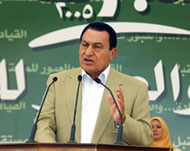Egypt’s poor untouched by boom
Egypt’s economy is growing at its fastest pace in years, exports are surging and the bourse is booming, but there is little sign yet of an economic revival in the poor suburbs and crowded slums of the capital.

Stall holders in Cairo’s dilapidated Bulaq al-Dakrour market complain of slow trade, state workers in shabby Sharabiya say their wages won’t support their families and in squalid Shubra al-Khaima boys sift through rubbish for less than a $1 a day.
President Hosni Mubarak, who is widely expected to win a presidential election on 7 September, has promised more liberalising reforms to please investors but also offered popular policies like hiking state salaries and preserving subsidies.
Economists say the reforms are likely to involve more short-term pain for Egypt’s poor, who rely on cheap subsidised bread and who will need to find work outside the bloated civil service in a land of high unemployment.
Liberalising economy
The challenges facing Mubarak include retraining workers laid off from newly privatised state firms, using subsidies more effectively and cutting government debt to encourage banks to start lending to businesses.
Only then, economists say, will the benefits start filtering down more effectively to Egypt’s 70 million people.
 |
|
Mubarak faces several economic |
“Unemployment is the biggest problem. A lot of people come and ask me for work, but I say I’ve already got workers,” said Attiyah Said Abdullah, 28, a baker who makes subsidised loaves.
Mubarak’s rivals in Egypt’s first multi-candidate presidential vote are also promising improvements.
One rival is offering 150 Egyptian pounds ($26) a month to the jobless, another pledges to cut down on government waste.
Reforms
But there is little sign of a real contest in the country that 77-year-old Mubarak has ruled for 24 years. In the sprawling capital’s rundown suburbs, Mubarak posters are virtually the only ones to be seen and few expect change.
“They (the politicians) say things, but they are just promises,” said Ibrahim Heikal, 24, a worker at the state railway who says he cannot afford to get married on his salary of 250 pounds a month.
Reforms that began last year, including selling state assets and slashing taxes, have set the economy on course for annual growth of 6%, a level last seen in the 1990s.
Demand abroad for Egyptian products has risen since the currency was floated in 2003, and investors have welcomed the changes by sending the stock market to all-time highs this year.
 |
|
Mubarak posters dominate the |
But some economists say there is more work to be done to help Egypt prepare for greater global competition.
“The reforms coming are going to be tougher. The real tricky one is going to be the short-term job losses inevitably associated with privatisation and how the government deals with that,” said a Middle East economist for an international bank, who asked not to be identified.
Unemployment
Egypt needs to create an estimated 700,000 or so jobs each year for new entrants to the labour market, a target Mubarak has vowed to meet in his campaign speeches.
Some economists say that even hitting 6% growth a year may only keep employment at current levels. The government says unemployment stands at about 10% but unofficial estimates are about twice that figure.
One problem is that banks have a hefty chunk of their assets tied up in government debt – a third or more according to an estimate by investment bank EFG-Hermes. This locks up money that could be used to finance new businesses and create jobs.
“The less you are willing to finance companies, the less companies are willing to expand, the less they are willing to hire people, it is a whole cycle,” said Hany Genena, senior economist at EFG-Hermes.
Economists say the government needs to reduce public debt, which stands at about 120% to 130% of gross domestic product, most of it domestic. But that will require some sensitive measures, like cutting subsidies.
Bread subsidies, on which many Egyptians depend, are likely to stay. But fuel subsidies that provide drivers with some of the cheapest gasoline in the world could soon be cut, economists said. Diesel subsidies have already been reduced.
Unskilled workforce
|
“The reforms coming are going to be tougher. The real tricky one is going to be the short-term job losses inevitably associated with privatisation and how the government deals with that” Middle East economist |
Even if the government starts cutting its borrowing requirement and entrepreneurs start unlocking more financing, Genena said the skills of the Egyptian workforce have not been keeping pace with the demands of globally competitive industry.
“There is some sort of skills mismatch,” he said, blaming shortcomings in the education system.
The European Union is funding projects, particularly in the textile sector, to retrain those laid off from privatised firms.
Economists say business needs to embrace the idea that training is an investment while workers have to learn that they can no longer rely on a job for life, even if poorly paid, in the protected state sector.
In Cairo’s slums, many are making do whatever way they can, like Mustafa Ahmed who sifts through rubbish in the filthy streets of Shubra al-Khaima for less than $1 a day.
“There is work, it’s just whether you want to do it,” he said as he rummaged for a broken coat hanger, the stench of rotting household waste polluting the air around him.